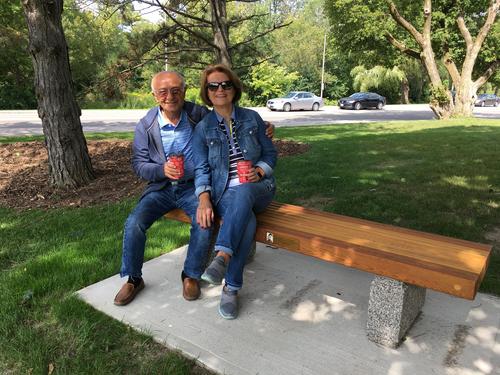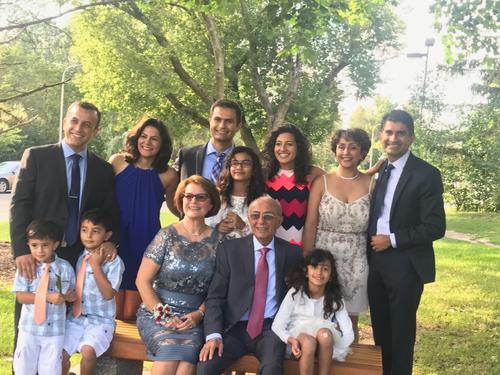
A seat of honour under the "tree of hope"
Campus bench commemorates parents’ love and support

Campus bench commemorates parents’ love and support
By Angela Pause Faculty of EngineeringWhen Jaleh Seyed Moossai and Nosratollah Soltani left Iran in 1991 to come to Toronto, they did so for one reason – to provide their children Tina, Sina, and Nima with an environment to succeed and grow.
What they did not know at the time was that their future in Canada would involve a close and inspiring connection with Waterloo Engineering.
In a span of 11 years, Tina (BASc ’98) and her two younger brothers, Sina (BASc ’99) and Nima (BASc ’09), would all graduate from Waterloo’s electrical engineering program.
Their time on campus had a profound influence on the entire family. So enriching was their experience at Waterloo, that Jaleh and Nosratollah would move to the city and, like many other Waterloo Engineering alumni, Tina would marry a classmate.
The family’s connection with the University of Waterloo began in 1993 when Tina was accepted into engineering.
Having recently adjusted to living in Toronto, her parents were unsure of her decision to attend university in Waterloo. Tina was adamant, however, convincing her parents that Waterloo Engineering’s co-op program would be beneficial in guiding her career choices. She began in civil engineering and transferred to the Faculty’s electrical engineering program within a year.
During semesters when Tina was on campus, Jaleh and Nosratollah would patiently sit under a maple tree outside of Needles Hall waiting for their daughter with a change of clothes so she would have something “good” to wear for that day’s co-op interviews. Afterwards, they would discuss how the co-op conversations went and what the future might hold.
The year after she started, Tina persuaded her younger brother Sina to leave behind scholarship offers from the University of Toronto and McMaster University to attend Waterloo with her, also in electrical engineering. Now, the Soltani parents had two children to wait for under “the tree of hope” as Nosratollah nicknamed the spot outside of Needles Hall.
In 2005, Nima, the youngest of the Soltani children, also enrolled in electrical engineering at Waterloo. Once again, the Soltani parents continued their tradition of waiting for their young adult son to return from co-op interviews when they would again discuss future possibilities.
Today, 20 years after Tina graduated with her degree in electrical engineering, there is now a bench under the tree just outside of Needles Hall where Jaleh and Nosratollah would sit.

Nosratollah Soltani, left, and Jaleh Seyed Moossai, sit on their bench under the "tree of hope."
The bench that includes a plaque with the inscription “Dedicated to our loving parents, Jaleh Seyed Moossai and Nosratollah Soltani, who have supported us in every step of our lives,” is a gift from Tina, Sina and Nima to honour their parents' 50th wedding anniversary in 2017.
The bench is the Soltani children’s way of ensuring that their parents’ sacrifice of leaving behind friends, family and a comfortable life in Iran, while always supporting their children during their educational journey, is physically represented on the campus they have all come to love.
Tina says that she and her brothers have always believed that it was their parents' support that helped them succeed at Waterloo.
“While we may have done the mechanical work of studying and learning, knowing they were there for us every step of the way made us feel that their names should be on our degrees as well,”says Tina from her home in San Jose. “So this bench is our way of ensuring they are part of the University of Waterloo and our education.”
Today, all three Soltani children make their homes in the Bay Area. Nima recently left a position at Apple for a startup, Sina works at Xilinx in San Jose, and Tina is employed by Dolby Laboratories in San Francisco. Whenever they come home to Waterloo, they return to the University campus with their own children.

The Soltani family during the bench dedication ceremony in 2017.
Jaleh and Nosratollah also still visit the campus, but now have a bench of their own to sit on as they observe other parents’ children fulfill their educational aspirations and perhaps dream of their grandchildren also becoming Waterloo engineers.

Read more
How Doug Kavanagh’s software engineering degree laid the foundation for a thriving career in patient care

Read more
Upside Robotics secures new funding to accelerate the future of sustainable farming

Read more
Redefining capstone learning by bringing students, faculty and community partners together to tackle real-world challenges
The University of Waterloo acknowledges that much of our work takes place on the traditional territory of the Neutral, Anishinaabeg, and Haudenosaunee peoples. Our main campus is situated on the Haldimand Tract, the land granted to the Six Nations that includes six miles on each side of the Grand River. Our active work toward reconciliation takes place across our campuses through research, learning, teaching, and community building, and is co-ordinated within the Office of Indigenous Relations.